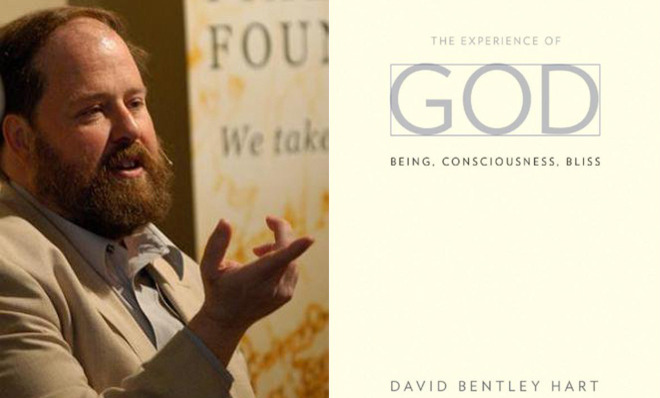The atheist's version of God is a straw man
Why do skeptics prefer their theism stupid?


A free daily email with the biggest news stories of the day – and the best features from TheWeek.com
You are now subscribed
Your newsletter sign-up was successful
When you make a purchase through links on our site, we may earn a commission
I appreciate Isaac Chotiner's objection to my review of David Hart's book The Experience of God. I'm somewhat less appreciative of the characteristically nasty, self-satisfied response of Jerry Coyne, a University of Chicago professor who is capable of writing cogent defenses of evolutionary theory but who lately seems to prefer playing to the bleachers, writing regularly for an audience of obsequious acolytes who set him up to knock down "weapons grade horseshit." To each his own, I suppose.
The charges against me (and Hart, whose book neither Chotiner nor Coyne has read) boil down to two: Practically no one holds the view of God that I sketched in my review, and even if they did, that view is nonsensical.
The Week
Escape your echo chamber. Get the facts behind the news, plus analysis from multiple perspectives.

Sign up for The Week's Free Newsletters
From our morning news briefing to a weekly Good News Newsletter, get the best of The Week delivered directly to your inbox.
From our morning news briefing to a weekly Good News Newsletter, get the best of The Week delivered directly to your inbox.
The core of my response is simply to say that the classical theism that Hart elaborates in his book and that I cursorily laid out in my review is far more widely held than Chotiner and Coyne appear to believe. It is found, in varying forms, in the work of Christian (Augustine, Gregory of Nyssa, Thomas Aquinas), Jewish (Maimonides), and Muslim (Avicenna) theologians, as well as numerous Hindu and Sikh sages. All of these sundry thinkers, and many others, describe a God who is (in Hart's words) "the infinite fullness of being, omnipotent, omnipresent, and omniscient, from whom all things come and upon whom all things depend for every moment of their existence, without whom nothing at all would exist."
Chotiner and Coyne are free, of course, to follow A.J. Ayer and other strict logical positivists in saying that such language is meaningless mumbo jumbo. But they should understand that in taking that tack they are going easy on themselves in the way that people always do when they dismiss their opponents rather than engage with them.
Chotiner and Coyne might argue that this a false challenge, since virtually no one in the real world actually views God in this highly abstruse way. As Hart points out in the opening pages of his book, this, too, is an unconvincing dodge: "It is always true, for any shared body of knowledge, conviction, or belief, that the principles and logic of the whole 'system' are most fully known only to a few individuals who have gone to the trouble to study them." This is certainly true of science, which is understood by most people in vague, largely metaphorical terms.
And yet no one would suggest that we judge the coherence or accuracy of particle physics by asking a vaguely informed non-scientist about it. Why, then, do critics of God think it sufficient to dismantle the untutored intuitions of non-theologians?
A free daily email with the biggest news stories of the day – and the best features from TheWeek.com
At this point, I should take note of the fact that Hart himself is unwilling entirely to write off those untutored intuitions, many of which often end up being "perfectly concordant with the more arcane formulae of the metaphysician: That God is Spirit, incorporeal, not an object located somewhere in space, not subject to the limitations of time, not a product of cosmic nature, not simply some craftsman who creates by manipulating materials external to himself, not composed of parts, but rather residing in all things while remaining perfectly one, present to us in the depths of our own beings."
Again, atheists are perfectly free to mock such claims and wave them away with a bit of snide laughter and a condescending roll of the eyes. (Come to think of it, that's been the approach taken by partisans of the Enlightenment for the better part of three centuries now.) But they should be honest about the fact that in doing so they are failing to contend with what, in both historical and philosophical terms, theism really is. As opposed, that is, to the patently silly straw man they clearly prefer it to be.
I should close by noting that I've quoted Hart liberally in this response because I wanted to show readers what a lucid and compelling writer he is, even when discussing unavoidably abstract ideas. For skeptics who genuinely wish to wrestle with the challenge of theism, I can think of no better place to start than his remarkable book.
Damon Linker is a senior correspondent at TheWeek.com. He is also a former contributing editor at The New Republic and the author of The Theocons and The Religious Test.
-
 What to know before filing your own taxes for the first time
What to know before filing your own taxes for the first timethe explainer Tackle this financial milestone with confidence
-
 The biggest box office flops of the 21st century
The biggest box office flops of the 21st centuryin depth Unnecessary remakes and turgid, expensive CGI-fests highlight this list of these most notorious box-office losers
-
 What are the best investments for beginners?
What are the best investments for beginners?The Explainer Stocks and ETFs and bonds, oh my
